Today’s poetry news round-up takes a look at the new poem by Simon Armitage, research into monks and their poetry and finally the winner of this years Giller Prize.
Tribute to Unknown Soldier
 As the nation marked Armistice Day yesterday, the poet laureate Simon Armitage read his poignant tribute to the unknown soldier. The poem, written specially by Armitage and titled “The Bed” speaks of the story of the retrieval of the body of the unknown warrior and then its repatriation. There is also a mention in the poem of the bouquets that royal brides send to be placed on the grave.
As the nation marked Armistice Day yesterday, the poet laureate Simon Armitage read his poignant tribute to the unknown soldier. The poem, written specially by Armitage and titled “The Bed” speaks of the story of the retrieval of the body of the unknown warrior and then its repatriation. There is also a mention in the poem of the bouquets that royal brides send to be placed on the grave.
This year marks the centenary of the burial of the body of the unknown soldier, who was laid to rest in Westminster Abbey following a proposal made by an army chaplain to the Sean of Westminster. The identity of the soldier buried there is not known; it was chosen from amongst four unidentified bodies from four battlegrounds and represents all those unidentified soldiers who fell during the war.
Research Shows Medieval Monks Were Not Quite as We Thought
 Recent research has suggested that far from being the pious men who devoted their lives to God and the monastery, monks in the medieval ages has something of a raunchy side and that included the penning of “dirty” poetry.
Recent research has suggested that far from being the pious men who devoted their lives to God and the monastery, monks in the medieval ages has something of a raunchy side and that included the penning of “dirty” poetry.
For a long time, historians have been more than a little annoyed that the Medieval period, or the Dark Ages, as it is often called, has been portrayed as a time of stagnation, a period when people appeared to have been more than a little rigid about life. This new research certainly casts a different light on those perceptions.
Whilst the time period was, in fact, responsible for many of the early ideas behind those things that we still use today, such as the mechanical clock, the assumptions have always been that most of the people were devoted to a life that was filled with faith and piety.
Monks spent a considerable part of their day copying out manuscripts and texts meticulously, often in less than perfect light. However, there were plenty of forms of amusement that they took part in. Writing code was a particularly popular form of stimulation for the mind, however, this recent research has also indicated something that comes as a bit of a shock. These monks would have also indulged in the less pious activities of writing and telling bawdy jokes and dirty poems – somewhat at odds with their monastical lifestyle.
2020 Giller Prize
 The poet and writer Souvankham Thammavongsa has been named as the winner of this year’s Giller Prize for her first fiction work, a collection of short stories.
The poet and writer Souvankham Thammavongsa has been named as the winner of this year’s Giller Prize for her first fiction work, a collection of short stories.
The poet, who lives in Toronto, was awarded the prize, which is worth $100,000 on Monday during a virtual ceremony, during which she reminisced that when the attended an ESL class 36 years ago one of the words that she pronounced incorrectly was knife, hence the title of the collection “How to Pronounce Knife”.
Born in Thailand in the Lao refugee camp, Thammavongsa was brought up in Toronto and has been highly praised over the years for her poetry books, of which there are four. This short story collection is a new direction for her which she says has built up as a result of a number of years of writing poetry.
Thammavongsa joins a list of previous winners which includes such names as Margaret Atwood, Madeleine Thein and Alice Munro.


You must register to comment. Log in or Register.